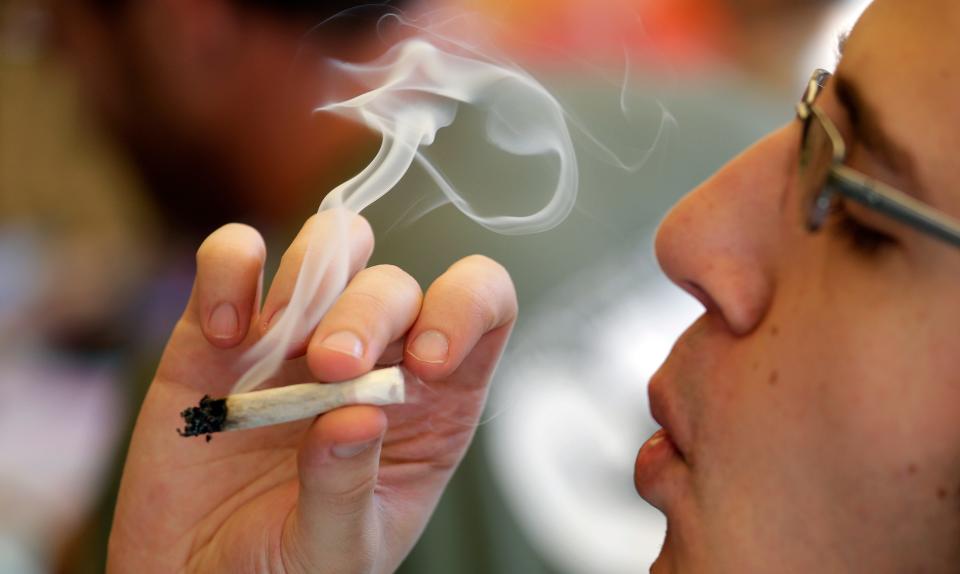Issue 2: Legalizing recreational marijuana would be good for Ohioans. Here's why.
- Oops!Something went wrong.Please try again later.
Ohioans will decide today whether or not pot goes mainstream here as it has it 24 other states an all of Canada.
The merits of Issue 2 have been hotly debated in our opinion section, and that's not meant as a pun.
If approved, Ohioans aged 21 and older will be allowed to possess, buy, and grow cannabis.
Marijuana products sold in Ohio would be taxed 10% on top of the state sales tax. Revenue collected would go to municipalities with dispensaries, a substance abuse fund, a social equity and jobs program and administrative costs.
Here are 3 guest columns in support of making adult-use weed legal in Ohio

Will marijuana make the workplace unsafe in Ohio?
Writer: Paul Armentano, deputy director of NORML, the National Organization for the Reform of Marijuana Laws, in Washington, DC.
Link to column: "The truth about marijuana. Ohio business groups are spreading myths about Issue 2."
Excerpt: "Concerns expressed by Ohio business groups that the passage of Issue 2, which seeks to legalize and regulate the adult-use cannabis market, will adversely impact workplace safety and productivity are premised on fear, not facts.
In reality, no provisions in Issue 2 weaken or limit existing workplace drug testing policies for cannabis. Furthermore, many safety sensitive positions — such as commercially licensed drivers — are governed by federal drug testing regulations. As a result, changes in the state-level status of cannabis will not alter these policies.

Moreover, studies consistently show that employees who consume cannabis during their off-hours are no different than their peers. Their workplace performance does not differ from that of their coworkers, many of whom consume alcohol, and they do not pose any increased safety risk."
Black people have been disproportionally harmed due to myths about cannabis. Issue 2 would be step in right direction.
Writer: Dan Malchesky, a Fisher College of Business student at Ohio State University specializing in finance and economics
Link to column: "Satan to murder. What foes have wrong about marijuana and Ohioans can get right with Issue 2"

Excerpt: "Since medical legalization of marijuana in Ohio, over 60,000 individuals have been arrested in the Buckeye State on cannabis-related offenses.
In addition, the FBI Crime Data Explorer was able to compile that police made well over a quarter million marijuana arrests across the country last year.
President Joe Biden has expressed his opinion on marijuana reform stating, “Criminal records for marijuana possession have also imposed needless barriers to employment, housing, and educational opportunities. And while white and Black and brown people use marijuana at similar rates, Black and brown people have been arrested, prosecuted, and convicted at disproportionate rates.”
This is all very true as African Americans are almost four times more likely to be arrested for marijuana than white individuals further highlighting the issue of racial disparity in the criminalization of this drug. However, none of these issues are new. Cannabis has been racially associated and criminalized dating back to the nineteenth century."
Passing Issue 2 a first step in righting wrong against victims of drug war.
Writer: Stephen Post, senior communications associate at Last Prisoner Project.
Link to column: "Issue 2 about more than smoking weed. How it would be a step in freeing victims of drug war"
Excerpt: "Policymakers should focus on providing resentencing and record clearance relief for those most harmed by prohibition instead of pondering how they could potentially deny the will of Ohio voters should cannabis legalization pass.
It is important that these retroactive relief measures be state-initiated and automatic to ensure the entire burden of restoring an individual’s freedoms falls on the government that had criminalized the individual in the first place.

Meanwhile, the governor already has the clemency power to enact this retroactive relief through pardons and commutations. If Ohioans don’t want to be part of the moral hypocrisy of allowing their government to imprison people for the same action it profits from, it's crucial for them to urge the governor to use that power.
Legalization of cannabis in Ohio would be the state’s first step to truly right history for victims of the war on drugs."
This article originally appeared on The Columbus Dispatch: 3 reasons to vote 'yes" on Issue 2 today

